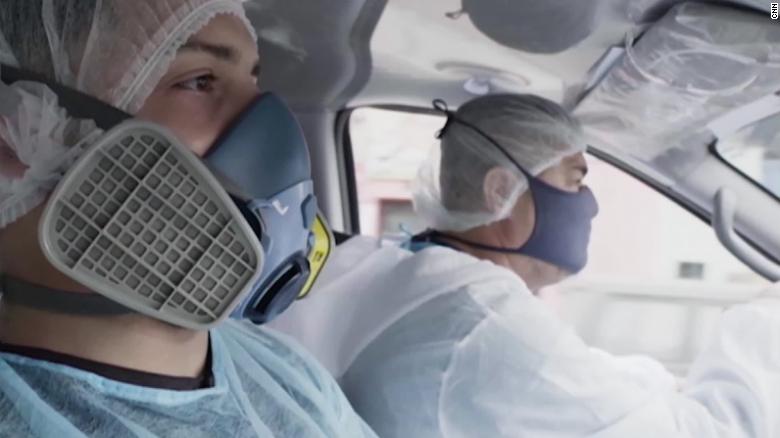The work that nobody wants to do: bury victims of covid-19 4:08
(CNN) - "Death, death, here it comes", sing Néstor Vargas and Luis José Cerpa with the radio through their face masks, as they drove down the road in their truck.
Dressed from head to toe with personal protective equipment, the two men collect the bodies of the people who died from covid-19 in Lima and its surroundings. It is a job that few want due to possible exposure to the virus. But these two Venezuelan immigrants are at risk.
"We are afraid that we may become infected and take him home, where I live with my wife, my children and my mother," said Vargas. He cradled his cell phone, with a photo of his wife and children as a screen saver.
Like tens of thousands of people, Vargas and Cerpa came to Peru to escape the collapse of their country's economy. According to the UN Refugee Agency, nearly 5 million have fled Venezuela since 2016 and at least 870,000 ended up in Peru, working in low-wage jobs to make ends meet or send funds to their impoverished loved ones.
MIRA: Priest relates that because of the pandemic he has seen entire families in Peru who have nothing to eat
Cerpa, 21, was a graphic design student before fleeing to Peru, where he worked as a waiter and bartender. Vargas, 38, worked in the funeral business in Venezuela, but had a job as a driver with the gas company in Peru. As the virus spread throughout the region, tourists disappeared and the business of burying the dead became a growing industry.
"We couldn't work for three months, and we needed to eat, pay the rent, and send money to Venezuela," Vargas said. "This job can be really difficult, but we have a saying here, the need has a dog's face."
He and Cerpa now earn $ 500 a month each for their efforts, almost double the minimum wage in Peru. They work up to 19 hours a day, seven days a week.
Despite Peru's early action to contain the pandemic, the coronavirus has spread like a forest fire across the country. More than 353,000 people have been diagnosed with the virus so far.
In each house, a familiar sound greets Cerpa and Vargas. Families sobbing, crying for their lost loved one. They try to get in and out of houses as quickly as possible while being respectful.
MIRA: Verification of facts: are people who have already had covid-19 immune to the coronavirus?
Most of the bodies they collect are from poor neighborhoods, from homes where people cannot afford to hire a funeral home to do the burial. There have been more than 13,000 deaths from covid-19, and the public health system is collapsing under the weight of the grim number. What remains for the poor is a death with little dignity.
The family of Raúl Oliveras, 63, called an ambulance when he became ill with the symptoms of covid-19. But he never came and they saw him die at home. That night, Vargas and Cerpa entered, and grabbed the sheets to lift the body from the bed.
As the neighborhood dogs barked and the family wept on the dark street, Vargas and Cerpa put Oliveras' body in a black body bag and stuffed it in the back of their truck for the trip to the crematorium.
At the city's El Angel Cemetery crematorium, many of the employees handling the bodies are also Venezuelans.
LOOK: AstraZeneca says it could have the covid vaccine "anytime from September"; if everything goes fine
"Peruvians do not. It's difficult, ”said Orlando Arteaga, who works seven days a week, earning the money he needs to support three children in Venezuela and a 2-year-old daughter in Lima. He says he never imagined that he would see so much death, but that "someone has to do it, and we need work."
Arteaga, 40, is in charge of the ovens, which run constantly. A pile of cardboard coffins is randomly stacked nearby.
“These are not even all the bodies. There are bodies in other places, because there is no space and we cannot leave them outside, ”he said.
"I do not wish this job on my worst enemy," he added.
By nightfall, Vargas and Cerpa had collected and delivered more than a dozen bodies. They were tired, but their work was not finished. Around 11 pm, his last call of the day came from the Villa María del Triunfo Hospital. Staff asked the men to collect 13 bodies because their morgue was overflowing.
Cerpa and Vargas arrived at the hospital and waited for the paperwork. Without their masks and gloves, they rested and ate chicken from a Styrofoam container. It was the first time in hours that they had had a break.
These stressful days have become the norm for them. “Sometimes we get home at 2 am or 3 am. After showering and eating it is already 4 am, ”said Cerpa. “We get up again and we have to leave at 8 in the morning. Then it is the same again until the next day. ”
Your days of mixing cocktails for happy tourists could also pass a lifetime. Still, he said he learned something important about life, after being surrounded by death: "Now I simply live day by day ... I live every day as if it were the last."

